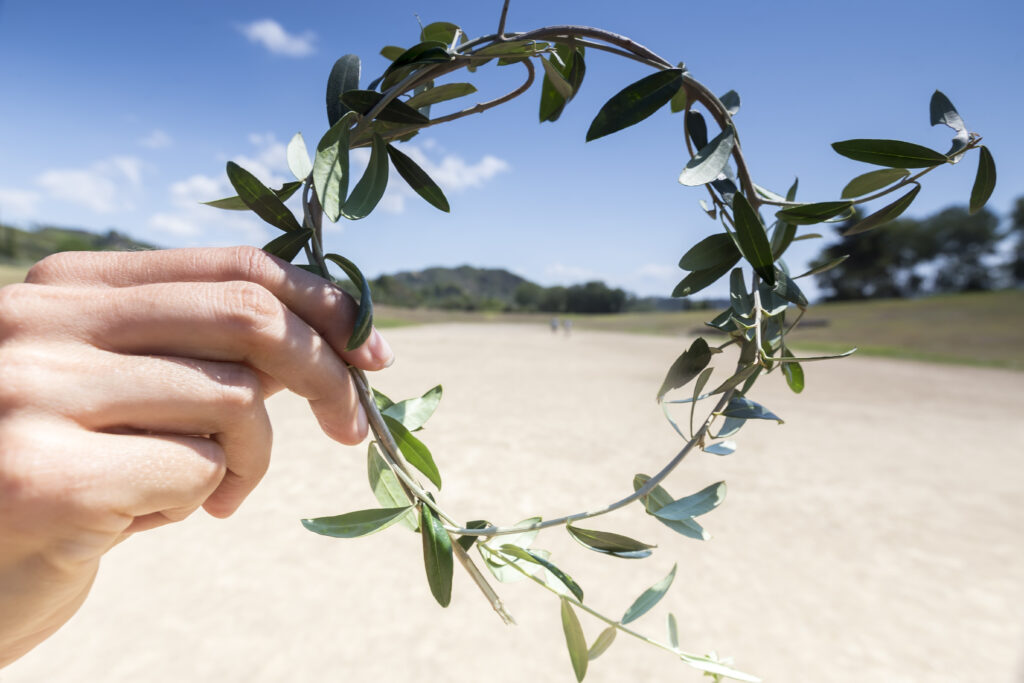
For ancient Greeks, sport meant much more than a way to keep fit. The word in Greek, athlesis (origin of athlete, athletism, pentathlon, etc) derived from the word athlos (άθλος) meaning the achievement of a very challenging goal. The labours of Hercules for example in Greek are called ‘athla’, and it is no coincidence that for ancient athletes, Hercules was their hero representing the man who kept exceeding his own personal limits of physical and spiritual strength. For that reason, statues of Hercules decorated the gymnasia in Ancient Greece as all athletes aspired to be like him. Interestingly, the word gymnasium derives from ‘gymnos’ (γυμνός) which in Greek means naked and so one can say that a gymnasium is the place of the naked. Actually, most of the Greek statues which are notoriously naked represent precisely those athletes who trained without clothes.
Training had its results in the beauty of the spirit and the body and that was to be shown to the world. This is reason why the Greek word for statue is ‘agalma’ (άγαλμα) meaning ‘sight which offers pleasure to the eye’. Thus, personal fulfillment was not at all a personal matter but rather a very communal one, and as such it had to be shared and enjoyed by everyone. The obsession of the Greeks with aesthetics ‘αισθητική’ and harmony ‘αρμονία’ was not restricted to arts like architecture, sculpture a.o. but was extended to their physical selves. These statues, however, do not just represent handsome young men, but more importantly noble warriors whose physical strength and competitive mind enabled them to defend their land efficiently against enemies.
All major sports actually mimic battle moves: run (to catch or escape an enemy), run with obstacles (over trunks, dead bodies, streams, rocks in a battlefield), wrestle and box (in body to body fight), javelin (throw spears in distance fight), disc (when left without weapons, lift heavy stones and hurl them against the enemy), riding on horse or chariot as fast as possible. The athlete was equaled to the warrior who had to have a strong body, strategic mind (strategic – ‘στρατηγική) but above all brave spirit (andria – ανδρεία), a virtue which in Greek is identified with the very essence of man (in Greek man is ‘andras’ – from where the English words andrologist, android, etc come from). It was unthinkable for any man not to be an athlete or miss daily training at the gymnasium, as that would make him unworthy at a social level and deprive him of the right to even call himself a man.
In ancient Greece all men trained, each in their own city, as there was no unified Greece, but city-states. By extension, being a warrior meant fighting and defending a city against another just like Athenians and Spartans did. At the Olympics, each athlete went to represent not Greece, but Athens, Sparta, Thebes, Corinth, etc against the others. The victory of an athlete was the victory of the city just like today the victory of an athlete is the victory of the country where he/she comes from. Generally, Greek cities were fighting brutally against each other over frontier territories most of the time.
At Olympia, though, an entirely different kind of fighting was born. It was a mimic of war at a national level, where men representing all different Greek cities would drop their warrior role and as athletes they would compete against each other in sports. Their only award, a simple olive wreath, symbolized that they fought for nothing else but peace this time. By means of a convention, the Greeks had managed for a few months every four years to turn war into a game and share for the first time in Greek history what they all loved, the most competing and becoming better for the sake of it. That unique concept in Greek is called ‘άμιλλα’ (amila) and has no translation in other than the Greek language.
by Elena Soulioti , Licenced Tourist Guide – Archaeologist